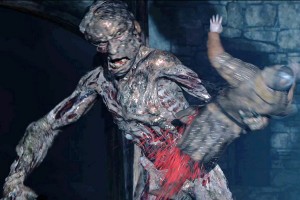 You might recall comedian Rodney Dangerfield’s old schtick about getting no respect. Our monstrous literary and cinematic creations might sympathize, as well as those who find them of interest beyond escapist pop culture entertainment.
You might recall comedian Rodney Dangerfield’s old schtick about getting no respect. Our monstrous literary and cinematic creations might sympathize, as well as those who find them of interest beyond escapist pop culture entertainment.
Last week I was looking at the intriguing academic research and writing of Michael Collings of Pepperdine University who has written extensively on the science fiction of Orson Scott Card, and the interesting connection between sci fi and Mormonism. I found a website mainted by Collings called StarShine and Shadows, and one of the essays on this site is titled “The Persistence of Darkness.” The essay was presented at the World Horror Convention in Salt Lake City, Utah earlier this year, and it represents a bold embrace of horror and the monstrous by an academic, and a discussion of their long and distinguished pedigree in literature.
Collings begins his essay with a humorous personal story about being asked to speak in connection with the opening of a new Cultural Arts Center associated with his university, despite his concern that his appreciation and writing on Stephen King might not sit well with potential contributors. Collings accepted the invitation and opened his presentation by saying, “William Shakespeare was the Stephen King of his day.” As one might imagine, this idea did not go over well with many in the audience, but Collings substantiates this claim as he develops this idea in the essay’s larger thesis about the “continuity of horror – both the monsters and the motifs – in literary history.”
Collings reminds his audience that horror has been in integral part of literature through the centuries, from Beowulf to Shakespeare to Stephen King, and that is has served an important cultural function. “Like Faustus, horror literature focuses on central fears of the society it anatomizes.” Given the continued presence and popularity of horror and monsters in various civilizations you would think that monsters would get more respect. Or at least that those who enjoy them, even specialize in studying them as serious a serious cultural phenomenon, might receive more respect, perhaps even some sense of legitimacy. But sadly this is not the case.
Our rapidly changing and dire economic times will undoubtedly produce more monsters, just as they did in times past. As Collings notes in connection with those living in Shakespeare’s England and the Beowulf poet’s Britain, “They too stood on the threshold of a world in which everything they accepted would be challenged, in which their very conceptions of the universe itself would undergo radical alternations. And they, like us, found a means of symbolizing, confronting, and adapting to that world: the images, emotions, and vicarious purgation of literary fear, terror, and horror.” If monsters provide us with the gift of dealing with our fears in troubling times, perhaps we should give them a little more respect for their services.





Shakespeare couldn’t have been the King of his day – he didn’t make nearly enough money.
I don’t know where anyone could get off saying that Shakespeare was the Stephen King of his day…are you kidding me? Stephen King, although a tremendously successful author, will never be remembered as Shakewpeare was. But that is only because King did not go around acting out his books in the streets with young boys as his female characters. Shakespeare is remembered because he was a first. Stephen King will be remembered because he is one of the best.